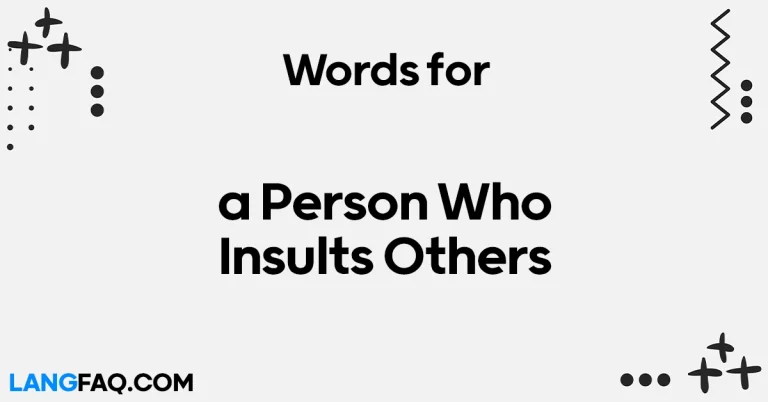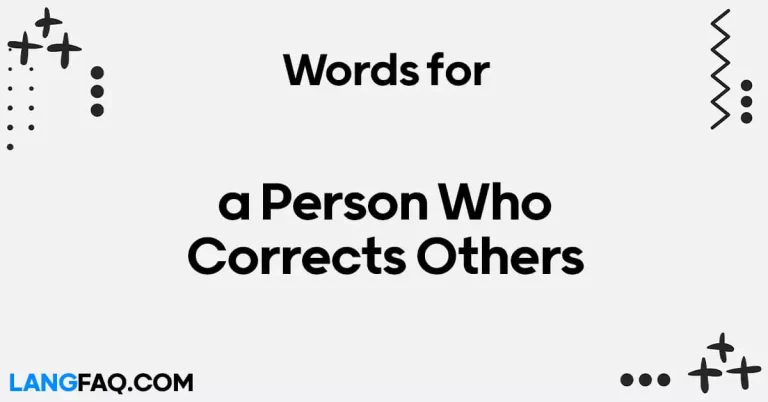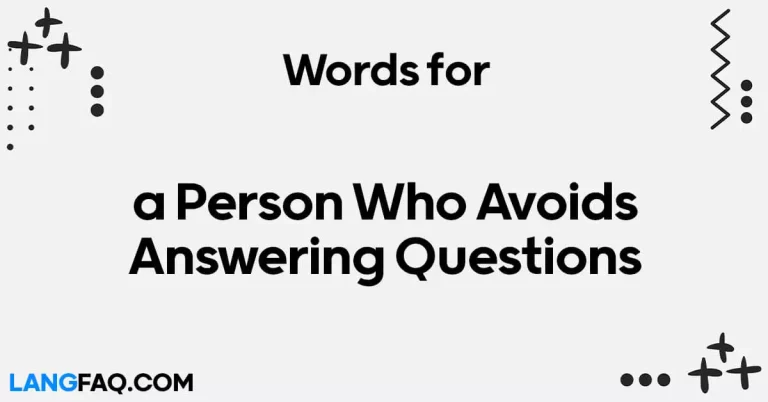In a world that celebrates kindness and empathy, it’s essential to understand how to describe someone who consistently ridicules or makes fun of others. In this comprehensive article, we’ll explore various terms and phrases to identify such individuals. From derogatory slang to clinical terminology, we’ve got you covered.
What Do You Call a Person Who Always Makes Fun of Others?
Let’s delve right into the heart of the matter. When searching for a suitable term to describe a person who habitually mocks or ridicules others, you might come across several options, each carrying its own nuances. Here are some of the most commonly used expressions:
- Bully: A broad term that encompasses various types of aggressive behavior, including mocking and ridiculing others.
- Tease: To make fun of someone playfully, but it can escalate to hurtful behavior.
- Mocker: Someone who mocks or ridicules others regularly.
- Derisive: An adjective describing someone who shows contempt or ridicule towards others.
- Scornful: A term for individuals who consistently express disdain or mockery.
- Scoffer: One who openly mocks or derides others’ beliefs or actions.
- Ridiculer: Someone who habitually mocks or belittles others.
1. Bully: The Broad Term
Definition: A broad term that encompasses various types of aggressive behavior, including mocking and ridiculing others.
When to Use “Bully”
- Use the term “bully” when you want to describe someone who engages in aggressive behavior towards others.
- Employ it in situations where the person’s actions involve mocking, ridiculing, or belittling others.
Grammar and Usage Rules
- “Bully” is a noun that refers to the person engaging in aggressive behavior.
- Example: “He’s been acting like a bully lately, making fun of his classmates.”
Exceptions
- While “bully” covers a wide range of aggressive behaviors, it’s essential to remember that not all bullies engage in mocking or ridiculing others. Some may use physical intimidation or verbal threats instead.
Tips
- If you encounter a bully, it’s crucial to report the behavior to the appropriate authorities or seek help from trusted individuals.
- Encourage open communication to address the issue and promote a safe environment.
2. Tease: The Playful Banter
Definition: To make fun of someone playfully, but it can escalate to hurtful behavior.
When to Use “Tease”
- Use “tease” when describing light-hearted banter or playful mocking among friends or acquaintances.
- Employ it in situations where the intention is not to harm but to create a friendly atmosphere.
Grammar and Usage Rules
- “Tease” can be both a verb and a noun.
- Example as a verb: “She likes to tease her brother about his singing.”
- Example as a noun: “Their teasing often leads to laughter.”
Exceptions
- Teasing should always remain light-hearted and not cross into hurtful territory. If it does, it becomes bullying.
Tips
- Know your audience when teasing to ensure that everyone is comfortable with the banter.
- If someone expresses discomfort, be ready to stop and apologize.
3. Mocker: The Consistent Ridiculer
Definition: Someone who mocks or ridicules others regularly.
When to Use “Mocker”
- Use “mocker” to describe someone who consistently engages in mocking or ridiculing behavior.
- Employ it when discussing an individual’s habit of making fun of others.
Grammar and Usage Rules
- “Mocker” is a noun used to refer to a person.
- Example: “He’s known as the office mocker due to his constant ridiculing of colleagues.”
Exceptions
- “Mocker” is a straightforward term with no significant exceptions in usage.
Tips
- If you encounter a mocker, consider setting boundaries and addressing the behavior directly.
- Seek support from friends or professionals to deal with the emotional impact of consistent ridicule.
4. Derisive: Expressing Contempt or Ridicule
Definition: An adjective describing someone who shows contempt or ridicule towards others.
When to Use “Derisive”
- Use “derisive” when you want to characterize someone who habitually expresses contempt or ridicule towards others.
- Employ it to describe a person’s overall attitude or demeanor.
Grammar and Usage Rules
- “Derisive” is an adjective used to describe a person.
- Example: “Her derisive comments during the meeting were unprofessional.”
Exceptions
- “Derisive” accurately conveys the notion of expressing contempt or ridicule and has no notable exceptions.
Tips
- Be cautious when dealing with individuals who exhibit derisive behavior, and consider addressing it calmly and professionally.
5. Scornful: Expressing Disdain or Mockery
Definition: A term for individuals who consistently express disdain or mockery.
When to Use “Scornful”
- Use “scornful” when describing someone who habitually expresses disdain or mocks others.
- Employ it to depict a person’s ongoing attitude or demeanor.
Grammar and Usage Rules
- “Scornful” is an adjective used to describe a person.
- Example: “His scornful attitude towards newcomers was unwelcoming.”
Exceptions
- “Scornful” effectively captures the concept of expressing disdain or mockery, with no notable exceptions.
Tips
- When dealing with scornful individuals, focus on promoting positive interactions and fostering a welcoming environment.
6. Scoffer: The One Who Mocks Beliefs or Actions
Definition: One who openly mocks or derides others’ beliefs or actions.
When to Use “Scoffer”
- Use “scoffer” when describing someone who openly mocks or derides the beliefs or actions of others.
- Employ it in situations where the person consistently expresses contempt.
Grammar and Usage Rules
- “Scoffer” is a noun used to refer to a person.
- Example: “She’s known as a scoffer when it comes to unconventional ideas.”
Exceptions
- “Scoffer” accurately describes the behavior of openly mocking beliefs or actions and has no significant exceptions.
Tips
- When encountering scoffers, consider engaging in respectful dialogue and fostering understanding between differing perspectives.
7. Ridiculer: The Habitual Belittler
Definition: Someone who habitually mocks or belittles others.
When to Use “Ridiculer”
- Use “ridiculer” to describe someone who consistently mocks or belittles others.
- Employ it when discussing an individual’s recurring behavior.
Grammar and Usage Rules
- “Ridiculer” is a noun used to refer to a person.
- Example: “Dealing with a constant ridiculer can be emotionally draining.”
Exceptions
- “Ridiculer” accurately captures the concept of habitual mockery or belittlement and has no notable exceptions.
Tips
- When facing a ridiculer, consider setting boundaries, seeking support, and prioritizing self-care to maintain emotional well-being.
The Psychology Behind It
Understanding the motives behind a person who consistently makes fun of others can shed light on their behavior. It’s essential to remember that these individuals may have their reasons, even if their actions are hurtful. Here are a few possible psychological explanations:
- Insecurity: Some people mock others to deflect attention from their insecurities or feelings of inadequacy.
- Power and Control: For some, making fun of others is a way to exert power and control over them.
- Peer Pressure: In group settings, individuals may mock others to fit in or gain approval from their peers.
- Past Trauma: Some may have experienced bullying or ridicule in their past, leading them to perpetuate the cycle.
Impact on Victims
The consequences of being on the receiving end of constant mockery can be severe. Victims often experience emotional distress, low self-esteem, and even depression. It’s crucial to recognize and address such behavior to create a more inclusive and compassionate society.
Coping Strategies
If you or someone you know is dealing with a person who always makes fun of others, here are some strategies to consider:
- Set Boundaries: Clearly communicate your boundaries and let the person know that their behavior is unacceptable.
- Seek Support: Talk to friends, family, or a therapist for emotional support and guidance.
- Confrontation: If safe, consider addressing the issue directly with the person engaging in hurtful behavior.
- Report It: In cases of bullying or harassment, report the behavior to authorities or relevant institutions.
- Self-Care: Prioritize self-care to maintain emotional well-being and resilience.
Frequently Asked Questions (FAQs)
What’s the difference between teasing and bullying?
Teasing is often playful and harmless, while bullying involves repetitive, hurtful behavior aimed at causing emotional or physical harm.
Can someone change their behavior if they’re always making fun of others?
Yes, with self-awareness and effort, individuals can work on changing their behavior and attitudes.
Are there specific terms for people who mock others based on their appearance?
Yes, terms like “body-shamer” or “appearance critic” are used to describe individuals who mock others based on their looks.
How can I support a friend who is a victim of constant mockery?
Offer emotional support, encourage them to seek help, and stand up against the perpetrator when necessary.
Is it ever okay to make fun of others in a light-hearted manner?
Light-hearted teasing among friends is acceptable as long as all parties involved are comfortable with it and no one is hurt.
What legal actions can be taken against someone who constantly mocks or ridicules others?
Depending on the severity and circumstances, legal actions such as restraining orders or harassment charges may be pursued.
Conclusion
In this comprehensive exploration of terms used to describe individuals who make fun of others, we’ve covered a spectrum of behaviors, from playful teasing to habitual mockery. Understanding these terms not only enhances our ability to communicate effectively but also empowers us to address inappropriate behavior when necessary. Here are some key takeaways:
- Choose Your Words Wisely: The words we use to describe someone’s behavior carry significant weight. Whether you opt for “bully,” “tease,” “mocker,” “derisive,” “scornful,” “scoffer,” or “ridiculer,” be mindful of the nuances each term conveys.
- Context Matters: Consider the context in which these terms are used. Is it a friendly exchange of banter among friends, or is it a serious matter of consistent ridicule? Tailoring your choice of words to the situation ensures clarity in communication.
- Grammar and Usage: Each term comes with its own grammatical rules. Understanding whether a word is a noun, verb, or adjective helps you employ it correctly in sentences.
- Exceptions: While most of these terms have straightforward usage, it’s essential to be aware of any exceptions or situations where a word may not apply as expected.
- Tips for Dealing: Dealing with individuals who engage in these behaviors can be challenging. Setting boundaries, seeking support, and prioritizing self-care are valuable strategies.
Remember that the goal is not just to label someone but to foster healthy communication, address harmful behavior, and promote a more empathetic and respectful society.
By using the appropriate terms thoughtfully and understanding their implications, you can navigate social interactions more effectively and contribute to a culture of kindness and understanding.







